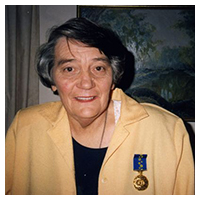

About the Helen Walker Research Grant
Supporting research that advances understanding and treatment of Pompe disease is central to the AMDA’s mission. Established in 2010, the AMDA Research Grant was created to fund projects dedicated exclusively to Pompe disease and to foster collaboration among scientists committed to improving patient outcomes.
In 2013, the grant was renamed the Helen Walker Research Grant to honor Helen Walker, a dedicated patient advocate and international leader in the Pompe community. Funded through the generosity of the Pompe community and initiatives like Pull for Pompe, this grant continues to drive meaningful progress in Pompe research while preserving Helen’s legacy of compassion, determination, and global advocacy.
The AMDA is committed to funding research that advances understanding and treatment of Pompe disease. Established in 2010 and renamed in 2013 to honor patient advocate Helen Walker, the grant supports projects dedicated exclusively to Pompe disease. Through the ongoing generosity of the Pompe community and events like Pull for Pompe, it upholds Helen’s legacy of compassion and dedication to global progress in Pompe research.
Research Funding Highlights
Projects Funded
Fund's Awarded

Honoring Helen Walker’s Legacy
In 2013, the AMDA renamed its Research Grant to honor Helen Walker (1940–2012), whose tireless advocacy transformed the global Pompe community. As founding president of the Australian Pompe Association and a board member of the International Pompe Association, Helen championed a singular mission: ensuring that every person with Pompe disease, regardless of location, had access to treatment and a voice in the community.
Throughout her advocacy work, Helen collaborated closely with Tiffany House, who served as president of both the AMDA and the IPA. Together, they advanced a shared vision of international collaboration and patient empowerment that strengthened connections across the global Pompe community.
Helen’s leadership exemplified the core values of the AMDA’s mission: uniting patients, families, and researchers to advance understanding and develop improved therapies for Pompe disease. By renaming the AMDA Research Grant in her honor, the organization ensures that Helen’s compassion, courage, and unwavering commitment to patients continue to inspire scientists and advocates working toward progress in Pompe research.
The AMDA renamed its Research Grant in 2013 to honor Helen Walker (1940–2012), a transformative advocate for the global Pompe community. As founding president of the Australian Pompe Association and board member of the International Pompe Association, Helen championed access to treatment and ensured every person with Pompe disease had a voice.
Collaborating with Tiffany House, then president of both the AMDA and IPA, Helen advanced international collaboration and patient empowerment. Her leadership exemplified the AMDA’s core mission: uniting patients, families, and researchers to deepen understanding and improve therapies for Pompe disease.
The Helen Walker Research Grant honors her legacy, inspiring new generations of scientists and advocates pursuing progress in Pompe research.
Helen Walker Research Grant Recipients
2024
Dr. Jaymin Upadhyay
Boston Children’s Hospital, Harvard Medical School
Title: Implementation of At-Home Functional Biomarker Methods in Patient with Pompe Disease
Focus: Data/registry and quality of life assessment
Summary:
This project seeks to develop simple, at-home tools that track how Pompe disease affects movement, breathing, speech, and thinking over time. By combining wearable sensors and biomarker tests, researchers aim to give patients and doctors an easier, more complete way to monitor health and treatment progress between clinic visits.
2023
Dr. Gregory Wyant
Massachusetts General Hospital, Harvard Medical School
Title: Autophagy Control of Glycogen in Skeletal Muscle
Focus: Disease mechanism and therapeutic target discovery
Summary:
This study is investigating how muscle cells normally break down glycogen inside lysosomes—the process that goes wrong in Pompe disease. By identifying the specific receptor that controls this step, researchers hope to uncover new targets for future therapies that could help restore healthy muscle function.
2022
Dr. Mark Tarnopolsky
McMaster University Children’s Hospital
Title: Biomarker and outcome measure discovery for Pompe disease through an evaluation of a Pompe Disease Targeted Multi-ingredient Supplement (PDT-MIS)
Focus: ERT optimization, biomarkers, and digital health innovation
Summary:
This project is working to make Pompe disease treatment more effective and personalized by identifying biomarkers that reflect disease activity and response to therapy. Researchers will also test wearable technologies and AI tools to improve how treatment progress is measured, while evaluating a new multi-ingredient supplement designed specifically for people with Pompe disease.
2021
Prof. Benedikt Schoser
Friedrich-Baur-Institute, LMU Munich
Title: Establishing an in vitro platform for comparative analyses of therapeutic interventions and basic research in Pompe disease
Focus: ERT optimization and preclinical testing platform
Summary:
This project is creating a laboratory model to compare how different enzyme replacement therapies perform in muscle cells affected by Pompe disease. By testing multiple approved and experimental treatments side by side, researchers aim to better understand their effectiveness and develop faster, more accurate ways—like Raman spectroscopy—to measure treatment success at the cellular level.
2019
Dr. N.A.M.E. van der Beek, Prof. A.T. van der Ploeg & Dr. W.W.M. Pijnappel
Erasmus MC, Center for Lysosomal and Metabolic Diseases
Title: Towards a [more] personalized treatment of patients with Pompe disease
Focus: ERT optimization and clinical outcomes
Summary:
This international study aims to understand how patients respond differently to enzyme replacement therapy over the long term. By examining why some individuals benefit more than others, and whether higher doses or improved delivery could help, researchers hope to refine global treatment guidelines and make Pompe care more personalized and effective.
2018
Dr. Emanuele Buratti & Dr. Andrea Dardis
ICGEB Trieste and Centro Malattie Rare, Udine, Italy
Title: Pre-clinical validation of FDA approved molecules able to rescue GAA pre-mRNA splicing of c.-31-13T>G mutants as therapeutic agents for late-onset Pompe Disease
Focus: Therapeutic development (mutation-specific treatment)
Summary:
This project is testing existing FDA-approved drugs that may correct the effects of a common genetic mutation found in many people with late-onset Pompe disease. By identifying small molecules that help cells process the enzyme properly, researchers hope to develop a targeted treatment that could improve or restore enzyme activity in affected patients.
2017
Dr. Virginia Kimonis
University of California, Irvine
Title: Antisense oligonucleotide treatment for Pompe disease
Focus: Therapeutic development and ERT optimization
Summary:
This research is testing a new treatment that targets the enzyme responsible for making glycogen in muscle cells. By using a genetic tool called antisense oligonucleotides (ASOs), scientists hope to reduce excess glycogen buildup—the root problem in Pompe disease—and strengthen muscles. The project will also explore how this new therapy works alongside current enzyme replacement therapy, aiming to create a more effective long-term treatment for patients.
2016
Dr. Frédéric LoFaso
Raymond Poincaré Hospital, Garches, France
Title: Acid Maltase Deficiency Myopathy Follow-Up
Focus: Clinical care and diagnostics (non-invasive monitoring)
Summary:
This project aims to develop better, non-invasive ways to measure how Pompe disease progresses over time. By creating reliable tests that don’t require muscle biopsies or effort-based evaluations, doctors will be able to track patients’ health more easily and accurately—especially as new therapies become available.
2015
Dr. Nina Raben & Dr. Rosa Puertollano
National Institutes of Health
Title: Curcumin: Can it promote cellular clearance in Pompe disease?
Focus: Therapeutic development and ERT optimization
Summary:
This study is exploring whether curcumin—a natural compound found in turmeric—can be safely added to current Pompe disease treatments. Researchers hope it may enhance the effects of enzyme replacement therapy or help protect muscle cells, offering patients improved treatment results.
2014
Dr. Giancarlo Parenti
Federico II University, Naples, Italy
Title: Analysis of Circulating and Tissue Specific MicroRNAs in Pompe Disease
Focus: Diagnostics and biomarker discovery
Summary:
This project is using advanced genetic sequencing to identify small molecules called microRNAs that may serve as biomarkers for Pompe disease. These biomarkers could help doctors better diagnose the disease, track how well enzyme therapy is working, and even uncover new treatment targets to improve patient outcomes.
2013
Dr. Barbara K. Smith
University of Florida
Title: Response to Diaphragmatic Pacing in Subjects with Pompe Disease
Focus: Respiratory care and quality of life
Summary:
This study is evaluating whether diaphragm pacing—a device that helps stimulate the breathing muscles—can reduce the need for mechanical ventilation in adults with Pompe disease. Researchers will also assess whether this approach improves comfort, independence, and overall quality of life for patients who rely on breathing support.
2012
Dr. Nuno Raimundo
University of Göttingen, Faculty of Medicine
Title: Mitochondria and Autophagy as Therapeutic Targets for Acid Maltase Deficiency
Focus: Therapeutic development and disease mechanism
Summary:
This project is testing new ways to boost the cell’s natural energy and cleanup systems—specifically mitochondria and autophagy—to lessen symptoms of Pompe disease. By strengthening these processes, researchers hope to improve how muscle cells function and uncover new treatment strategies beyond enzyme replacement therapy.
2011
Dr. Pascal LaForêt
Pitié-Salpêtrière Hospital, Paris, France
Title: Aerobic Exercise Training in Pompe Disease
Focus: Rehabilitation and quality of life
Summary:
This study is testing whether regular aerobic exercise can help people with late-onset Pompe disease improve endurance, muscle strength, and breathing capacity. Understanding these benefits could help patients safely incorporate exercise into their care plan and enhance overall quality of life.
Dr. Barbara K. Smith
University of Florida
Title: Clinical and Electrophysiological Assessment of Respiratory Function in Pompe Disease.
Focus: Respiratory care and neuromuscular function
Summary:
This project aims to understand how nerve signals to the diaphragm—the main breathing muscle—are affected in adults with Pompe disease who have trouble breathing. By studying how nerve and muscle function relate to breathing ability, researchers hope to improve respiratory monitoring and guide better treatments to preserve breathing strength.
2010
Dr. Andrea Amalfitano
Michigan State University
Title: Pre-clinical studies for Acid Maltase Deficinecy (AMD) Gene Therapy in a Non-human Primate Model
Focus: Gene therapy development (next-generation treatment approach)
Summary:
This project is exploring a new way to treat Pompe disease by delivering a healthy copy of the GAA gene directly to the liver using a gene therapy vector. If successful, the liver would produce and release the missing enzyme throughout the body, offering longer-lasting benefits than current enzyme infusions and potentially reducing the burden of frequent treatments for patients.

